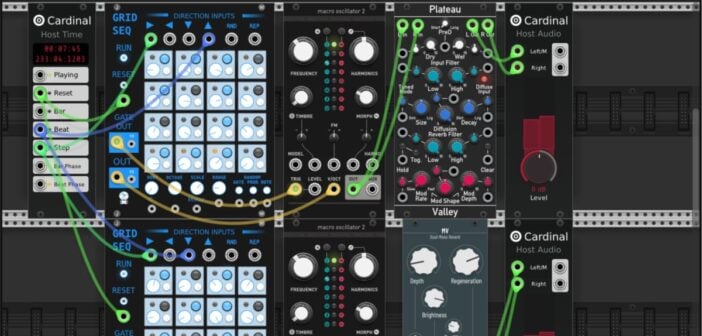KX Studio released Cardinal, a FREE and open-source virtual modular plugin for macOS, Windows, and Linux.
Cardinal is a free and open-source virtual modular plugin, but perhaps more importantly, it’s a free introduction to the world of modular. Modular synthesis is often any combination of weird, wonderful, and expensive the further you fall down the rabbit hole.
Cardinal provides a way for modular newbies to familiarize themselves with different types of modules, their functions, and how they interact with each other without spending a penny.
If that sounds familiar, it’s because Cardinal is heavily influenced by VCV Rack. The difference is that the plugin version of VCV Rack (Rack Pro) is a commercial product and not free. So, Cardinal isn’t trying to best VCV Rack as such; it’s more about providing the rack-style setup as a plugin while remaining free and open-source.
Cardinal isn’t just for modular newbies; having access to an expansive rack set up anywhere, anytime, without the need to travel with lots of hardware should appeal to seasoned pros, too.
Despite having fewer modules than VCV, Cardinal isn’t short of options and features modules based on some classics like Plaits from Mutable Instruments. It also features many third-party developers like ChowDSP, a developer we’ve covered a few times.
A basic setup might start with a MIDI module, which allows you to send data from your MIDI keyboard/controller, followed by an oscillator, envelope generator, VCA, filter, and audio output module.
Getting started in Cardinal is easy because you can search modules by brand or tag and find whatever you need in seconds. Once you start adding modules, you can go crazy till you see nothing but patch cables, but it’s great for beginners to know you can start making noise so quickly.
Cardinal offers three plugin variants, Main, Synth, and FX. Each variant performs equally but has a different IO configuration and varied metadata. You can see a complete list of differences on the Cardinal product page.
You’ll also find a feature comparison of Cardinal and VCV’s Rack Pro on the same page, which is pretty interesting.
Many people will like Cardinal because it’s a fully self-contained plugin, and it’s still free. It has a lot of promise for learning about modular and CV, building synths, sequencers, and modular effects.
Don’t forget to get what you can while you can from our top 100 Black Friday Deals.
Cardinal is available in AU, VST2, VST3, LV2, and CLAP formats for macOS, Windows, and Linux.
Download: Cardinal
More:



12 Comments
Jed
onThis is FaNtAsTiC!
Rafael
onI was sure BPB had already posted about Cardinal before, I may be mistaken. Also anyone interested, beware that when James says “self-contained”, he really means it. ALL plugin settings, including favorites, are on a per-instance basis, so be smart about it if using built-in VST presets (.vcv file presets/selections you import on Cardinal itself don’t suffer from this). This is by design, to make Cardinal as portable and unintrusive as possible, but it does have drawbacks.
And be mindful that there’s a lot of untapped potential of running modular as a plugin, people barely use it as a plugin rather than just “VCV inside something else”.
Tomislav Zlatic
onYeah, not yet covered in the BPB news section, but it definitely deserves a place here. Fantastic plugin!
alex
onGreat! Thx!
MRG
on“Cardinal is heavily influenced by VCV Rack” …understatement of the millenium.. :P
It’s nice to be able to use in a simple way VCV Rack inside a DAW. Especially since while I kinda like the idea of modular for the sound, I was never really a big fan of hardware sequencers.
nine
onThis seems like a fork to give people features of VCV Rack Pro without having to compensate the developer. Please consider purchasing the paid version of VCV Rack to support the person that’s done such good bringing modular synth goodness to so many people.
Jed
onShould we purchase Voltage Modular too?
Daniel C
onJED, definetely. Voltage Modular is a marvel. I prefer it to VCV.
Rafael
onMore like a fork to give people an up to date VCV Rack VST version that is open source. Remember, VCV Rack is still an open source project thus doing an unofficial VST port is as fair as it gets.
Futhermore, the team has taken their own spin on it in many ways; they could have matched VCV Pro much closer if they wanted.
OldDoGO
onThenatan Clone is free with coupon code- BFFREE.
Get it here- https://www.thenatan.store/p/clone-mixcheker-plugin/
Michal Ochedowski
onThanks for the info.
Alex
onThe fact that you can’t add some of the most popular module plugins totally kills the appeal. Open source can be like a religion for some folks, but making stuff takes time and time is money. Open does not always mean better. Sometimes it means a project is run by hackers with ADHD who give up 6 months later because, guess what, you have to go off and make money somehow. It would be better for these guys to submit patches to VCV Rack if they have suggestions or improvements instead of trying to compete with the VCV Rack team.